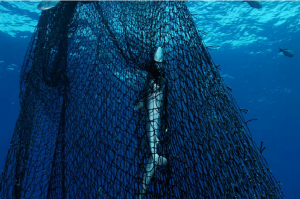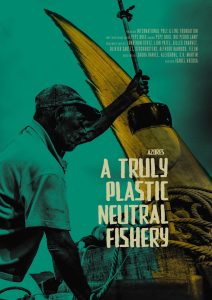Plastic pollution in the ocean has been an increasing global concern for decades. Marine plastic debris litter coastlines entangles endangered and protected species and has toxic, cumulative effects throughout the food chain. In doing so, it spreads diseases, contributes to invading alien species into an environment, and regularly enters the waters of those who did not cause the pollution. The burden of plastic pollution is often felt by small island communities whose waters have become increasingly plagued by plastic bottles, packaging, and abandoned, lost or discarded fishing gear (ALDFG).
ALDFG encompasses a significant proportion of global ocean plastic pollution by weight, and lost fishing nets are considered the most harmful form of ocean plastic pollution. Synthetic nets remain in the ocean indefinitely until removed. In the Azores archipelago, these “ghost nets” entangle, suffocate, and kill a wide range of marine megafauna, impacting ecosystems.
To draw attention to this issue, IPNLF worked with local partners the Sea Observatory of the Azores (OMA), POPA, and IMAR to quantify the annual weight of ALDFG produced by the Azores pole-and-line fishery in 2019. It was found that the entire fleet only loses 0.5kg of fishing gear-related litter annually. This amount is near to nothing compared to other gear types, such as longline, trawling, or purse seine methods, that use far more plastic (nets) in their operations. However, all gears must be held to the same environmental standard.
From this analysis, the project partners created The Plastic Neutrality Project. In collaboration with the Sea Observatory of the Azores (OMA), POPA, IMAR, Associação de Produtores de Atum e Similares dos Açores (APASA), FPA, and with funding from Fish4ever and Biocoop France, the project coordinated three annual Ghost Gear Removal Competitions from 2021 to 2023.
The competition among the pole-and-line fleet was to remove ALDFG and marine debris they encountered during their fishing trips and, in doing so, achieved the world’s first plastic neural fishery. In the first year of the competition, fishers removed 875 times more plastic than they lost, and in the following year, the fleet removed 734kg of marine litter (620kg confirmed to be fishing gear), which is almost 1500 times more plastic than they lost in the same time frame. Therefore, in 2022, the Azores was already officially named the world’s first “plastic-neutral fishery”!
Last year, 2023, was even more successful as the fleet had already matched the achievements of previous years, with still two months left in the competition. The competitions achieved their primary objective and elevated the fishery to a plastic-positive status for the next 800 years.
 To be the world’s first plastic-neutral fishery is an incredible achievement. While one-by-one fisheries do not contribute significantly to oceanic plastic pollution, this project allows them to contribute solutions to some of the most significant issues our oceans and coastal communities face. It has set a new standard for best practices in the industry. Polluting fisheries must now be held to this standard to help fight plastic pollution at sea, and this creative solution to plastic removal can be applied to the broader industry to drive positive change ocean-wide.
To be the world’s first plastic-neutral fishery is an incredible achievement. While one-by-one fisheries do not contribute significantly to oceanic plastic pollution, this project allows them to contribute solutions to some of the most significant issues our oceans and coastal communities face. It has set a new standard for best practices in the industry. Polluting fisheries must now be held to this standard to help fight plastic pollution at sea, and this creative solution to plastic removal can be applied to the broader industry to drive positive change ocean-wide.
We now want to raise the profile of this achievement and use it to drive change in the broader industry. With renowned photographer and videographer Pepe Brix, IPNLF produced the short film “A Truly Plastic-Neutral Fishery” and submitted it to international film festivals. The film has already been selected for Ocean Films Húsavík in Iceland, VISION 2023 in Italy, and Babul Eco Film Fest in India. It will premiere on 6 June 2024 at the Pacific Whale Foundation’s Annual World Whale Film Festival in Hawaii!
IPNLF has sent the short documentary to film festivals worldwide and is waiting for a reply on the submission status and judges’ critique of 20+ festivals. We will update this page in the upcoming weeks and add more locations with confirmed screening.
Screening date: 6 June, 2024
The Pacific Whale Foundation (PWF) conducts research, education, conservation, and outreach programs to protect the ocean through science and advocacy and inspire environmental stewardship. Founded in 1980 as a 501(c)(3) nonprofit organisation dedicated to saving the world’s whales from extinction, PWF owns the social enterprise PacWhale Eco-Adventures, which offers fee-based programs and services to help support the nonprofit.
With memberships, donations, charitable grants and a remarkable group of dedicated volunteers, PWF now reaches more than 400,000 individuals annually through its Maui and Australia offices and research projects in Ecuador and Chile. This year, we are hosting our 8th Annual World Whale Film Festival. Our late founder, Greg Kaufman, and his wife, PWF documentary filmmaker Selket Kaufman, started this event. It is dedicated to celebrating marine conservation efforts and indigenous ecological knowledge worldwide.
Screening date: June 2024
This is the 8th edition of BEFF – Babul EFF, the first and only International Environmental Film Festival in Hyderabad and South India! The festival is hosted in multiple locations across Hyderabad, India, followed by screenings in different cities. To ensure a better connection with the audience and leverage mileage nationally and internationally, the festival is held annually during the first week of June to coincide with World Environment Day.
Screening date: 19 July, 2024
Ocean Films Húsavík is a film festival that was held for the first time in 2021 at the Whale Museum in Húsavík. Several films were shown, all of which had in common to deal with subjects related to the sea and the nature of Iceland. The festival is a joint project of the Whale Museum in Húsavík and Whale Wise.
An award to recognise the social commitment of young debuting artists and established directors, Vision 2030 was born to become the national point of reference for the debate and promote cinematographic and audiovisual works relating to the 17 objectives of the UN 2030 Agenda.
The Festival supports excellence, enhancement of human capital, sustainable economic growth, productivity and competitiveness by involving Noto’s commercial activities and associations.